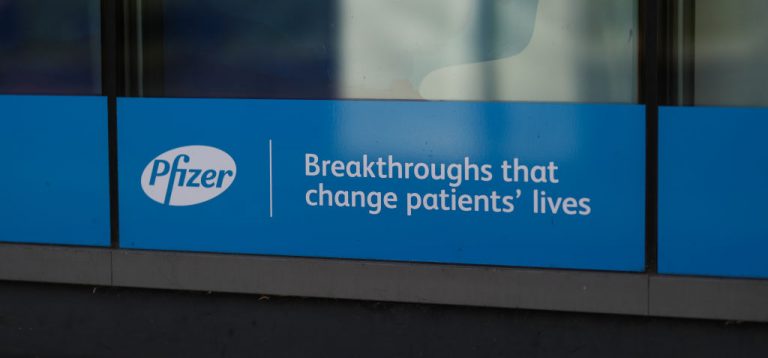A whistleblower who was employed as a director with a company listed as one of several study locations in the clinical trials for the Pfizer-BioNTech novel gene therapy Coronavirus Disease 2019 (COVID-19) vaccine says data was falsified and adverse reactions were slow to be reported.
After the director alerted the FDA as to the problems, she was terminated the same day.
The bombshell revelations came in an article published Nov. 2 in a publication no less significant than the British Medical Journal. Author Paul Thacker, who discloses that he is also a recipient of two doses of the Pfizer injection, says that Brook Jackson, a woman who served as Regional Director at Ventavia Research Group in Texas provided “dozens of internal company documents, photos, audio recordings, and emails” to the Journal to substantiate her allegations.
Ventavia, listed on the website for the clinical trial for the Pfizer vaccine as being three of several study locations in the Texas area, is accused of practices such as “falsified data, unblinded patients, employed inadequately trained vaccinators, and [being] slow to follow up on adverse events reported in Pfizer’s pivotal phase III trial.”
Jackson told The Journal that during her short stay at Ventavia, two weeks in September of 2020, “She repeatedly informed her superiors of poor laboratory management, patient safety concerns, and data integrity issues.”
Success
You are now signed up for our newsletter
Success
Check your email to complete sign up
READ MORE:
- Experiment Finds Pfizer Vaccine Desaturates and Clots Red Blood Cells, Contains ‘Garbage’ Crystalline Structures and Fibers Under Microscopy
- Comcast Allegedly Pulls Ad Exposing 13-Year-Old Girl’s Vaccine Adverse Reaction Set to Air During FDA
- Trio of Pfizer Scientists Expose Surveillance and Profit-driven Corporate Culture, Virtues of Natural Immunity on Hidden Camera
Jackson is no amateur, carrying a pedigree involving more than 15 years of experience, training as a clinical trial auditor, and a former role as a director of operations before Ventavia.
When Ventavia declined to address the issues Jackson attempted to raise, she decided to begin documentation of the situation with her personal phone, “One photo, provided to The BMJ, showed needles discarded in a plastic biohazard bag instead of a sharps container box,” said the article.
“Another showed vaccine packaging materials with trial participants’ identification numbers written on them left out in the open, potentially unblinding participants.”
The Journal noted Ventavia executives actually challenged Jackson as to why she was photographing the site.
The article explains that, according to the trial’s design, unblinded staff were to prepare and administer either the vaccine or the placebo, which “was to be done to preserve the blinding of trial participants and all other site staff, including the principal investigator.”
“However, at Ventavia, Jackson told The BMJ that drug assignment confirmation printouts were being left in participants’ charts, accessible to blinded personnel.”
“As a corrective action taken in September, two months into trial recruitment and with around 1000 participants already enrolled, quality assurance checklists were updated with instructions for staff to remove drug assignments from charts.”
And Ventavia’s brass was aware of what was transpiring, evidenced when Jackson recorded a meeting with two Ventavia directors and one executive “explaining that the company wasn’t able to quantify the types and number of errors they were finding when examining the trial paperwork for quality control.”
Jackson presented The BMJ with a list of “action items” predating her start date in order to prove the claim of data falsification. In the documents, one company executive identified a trio of staff to “Go over e-diary issue/falsifying data, etc” with.
A note in the document further denoted an employee was “verbally counseled for changing data and not noting late entry.”
The cache also showed that Ventavia was not expedient in handling data entry queries as required by their contract. An email from ICON, a “contract research organisation with which Pfizer partnered on the trial” was shown to have “highlighted over 100 outstanding queries older than three days in yellow.”
ICON reminded the company all inquiries were expected to be replied to within 24 hours.
“Examples included two individuals for which ‘Subject has reported with Severe symptoms/reactions … Per protocol, subjects experiencing Grade 3 local reactions should be contacted. Please confirm if an UNPLANNED CONTACT was made and update the corresponding form as appropriate’,” expounds the article.
Jackson called the FDA on Sept. 25 to “warn about unsound practices in Pfizer’s clinical trial at Ventavia,” following up by email. The company proceeded to terminate her the same day, alleging in a separation letter that Jackson was simply “not a good fit.”
Ventavia represented 1,000 participants in Pfizer’s clinical trial, which was composed of more than 44,000 people. The article says Jackson’s email to the FDA “listed a dozen concerns she had witnessed,” such as:
“- Participants placed in a hallway after injection and not being monitored by clinical staff
– Lack of timely follow-up of patients who experienced adverse events
– Protocol deviations not being reported
– Vaccines not being stored at proper temperatures
– Mislabelled laboratory specimens, and
– Targeting of Ventavia staff for reporting these types of problems.”
The BMJ continues, “Within hours Jackson received an email from the FDA thanking her for her concerns and notifying her that the FDA could not comment on any investigation that might result.”
“A few days later Jackson received a call from an FDA inspector to discuss her report but was told that no further information could be provided. She heard nothing further in relation to her report.”
“In Pfizer’s briefing document submitted to an FDA advisory committee meeting held on 10 December 2020 to discuss Pfizer’s application for emergency use authorisation of its covid-19 vaccine, the company made no mention of problems at the Ventavia site. The next day the FDA issued the authorisation of the vaccine.”
The article also states in August of 2021, the FDA inspected 9 of the trial’s 153 study sites, but overlooked Ventavia.
The BMJ also states that in the time after Jackson’s termination, Pfizer has hired Ventavia to participate in four other clinical trials involving the pediatric version of the COVID-19 vaccine, a variant for pregnant women, a COVID booster injection, and another involving an RSV vaccine.
Another Ventavia employee, who asked to remain anonymous, told The Journal they had worked at “over four dozen clinical trials in her career, including many large trials, but had never experienced such a ‘helter skelter’ work environment as with Ventavia on Pfizer’s trial.”
The second employee was also paraphrased as stating, “In several cases Ventavia lacked enough employees to swab all trial participants who reported covid-like symptoms, to test for infection.”
“Laboratory confirmed symptomatic covid-19 was the trial’s primary endpoint, the employee noted.”







